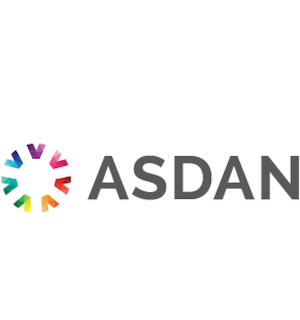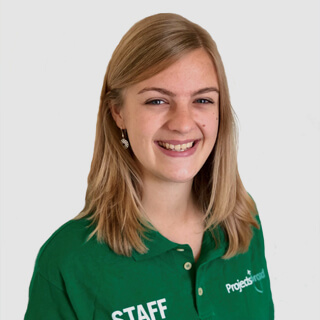It isn’t easy to explain what Micro-finance is. The Cambridge Dictionary gives this simple definition: “Micro-finance is the activity of providing financial services, such as small loans, to poor people or new businesses that cannot use traditional banking services, usually in developing countries.”
From our perspective, Micro-finance is more than just a financial service. At Projects Abroad, we use it as a tool to empower entrepreneurs and small businesses directly, helping members of the community become more financially independent. We provide financial services, and go a step further by also teaching our beneficiaries about things like:
- Basic numeracy
- Marketing
- Bookkeeping
- Crafting business plans and strategies
Below, we answer two important questions to explain how we use Micro-finance volunteer opportunities abroad as a tool to empower disadvantaged communities:
- How does Micro-finance work?
- What are the benefits of Micro-finance?

1. How does Micro-finance work?
We run Micro-finance Projects in Asia and Africa. Our projects run as Micro-finance internships abroad, which are perfect for students interested in business and finance. At the same time, our projects also function as Micro-finance volunteering, which is a great fit for finance professionals looking for volunteer opportunities overseas.
We select, distribute, and implement loans to chosen beneficiaries from different communities in need around the world.
In Tanzania, we work exclusively with women from disadvantaged backgrounds, who need loans to develop their businesses and contribute to their family’s income. In Senegal, we work with former street children (known as Talibés) to help them secure a more stable future through small-scale entrepreneurship.
Cambodia is a great example of a country that can benefit significantly from Micro-finance Projects. In many Cambodian communities there are few job opportunities. Therefore people turn to self-employment to support their families.
These entrepreneurs, who are mostly women, are struggling to get their businesses to thrive. They usually don’t have a bank account because they live too far away from the city, or don’t have the required documents to open one. In addition to being financially unstable, it makes it difficult for them to get a loan.
In our experience, Micro-finance can break down barriers, and give people the tools and knowledge they need to grow their businesses. This is how we make it happen:
We grant interest-free loans to selected beneficiaries
All of our Micro-finance volunteer abroad programmes start with an interest-free loan. Before beneficiaries receive a loan, our team of Project Coordinators and volunteers carefully select successful candidates.
This process is crucial for the long-term success of our micro-finance lending programme. We want to make sure that the financial help we provide makes a real difference in the community while we empower individuals. It’s important to choose the right entrepreneurs, who have a clear vision for their businesses, but need a loan to make it a reality.
How does the selection process work?
We conduct interviews with potential beneficiaries as part of the selection process. To be eligible for a loan, candidates must:
- Have a permanent address
- Have a phone number
- Be debt free
From this point, our team uses a ranking system based on different criteria such as the quality of their business plan, their reputation in the community, and their current business state. This gives us a better idea which entrepreneurs we can work with.
Let’s use Cambodia as an example. Here, we work in partnership with a local NGO, Khemara, because they have direct knowledge about the communities and their needs. In 2019, we granted 47 interest-free loans of $120 to local entrepreneurs from low income backgrounds.
They live mostly in the rural community of Silk Island in Phnom Penh, and typically make money selling food and drinks, vegetables, clothes, or beauty products. Getting these loans helped them expand or diversify their product offerings or services, so that they could increase their sales and income.

We provide business training
An interest-free loan is just a starting point. From there,we also help entrepreneurs acquire the skills they need to be successful in the long term. Typically, the loan programme lasts 24 weeks.
Our team gives personalized advice or coaching in line with the needs of the individual beneficiaries. For example, this could be training on bookkeeping for weavers, or teaching basic numeracy. Since every beneficiary has their own speciality, a different knowledge level, and a different need, it helps to have interns and volunteers from different backgrounds supporting them.
The language barrier between our volunteers and interns and beneficiaries can be challenging, but our staff are always on hand to assist with communication. They’ll always be happy to translate for you when needed.
New beneficiaries always have an initial training session before they sign their contract and receive their loan. We give them a brief overview on how the loan and reimbursements work, and focus on basic training in bookkeeping, marketing, and savings.
Our Micro-finance team will also interview each beneficiary halfway through the loan programme to evaluate how their business is going. Depending on their results, we can then provide additional support and guidance if needed.

We provide resources for additional support
With Khemara’s help in Cambodia, we also run several initiatives to donate additional resources to beneficiaries. For example, with the financial contribution of our interns from Union College in the United States, we donated an ice box to a 70 year-old vendor so that she could carry more products to the market. This made her life easier as she lives far away from the market. It also allowed her to store more fruits and vegetables and ultimately increase her income.
Our interns and volunteers can also use their talents to create marketing resources such as business cards and posters. A lot of beneficiaries don’t have access to the internet or software to produce these. This helps salon owners and food vendors to promote their business and products.
During their Micro-finance Projects, our interns and volunteers can get their hands dirty too. They sometimes help out beneficiaries for different tasks such as redecorating a store or picking ginger at a farm. They’re helping out, and getting direct insight into the hard work and dedication that goes into running a business!
We monitor progress
An important part of the programme is the loan reimbursement. Our team visits beneficiaries once every two weeks to collect a small part of the loan reimbursement. At the same time, we collect savings that Khemara deposits in the bank for them.
At the end of the programme, they’ll be given back their savings in cash. This process encourages beneficiaries to manage their money properly, which they’re not always used to. Paying back the loan on time will also be taken into account if a beneficiary wants to apply for a second loan.
This process also allows our Micro-finance team to follow up on individual progress or difficulties throughout the programme. They can be given additional support accordingly.
We plan next steps
At the end of the loan period (24 weeks), our Micro-finance team runs a final evaluation to understand the impact that we had on their business. Based on this evaluation and the beneficiaries’ plans for the future, Projects Abroad and Khemara give them further guidance and support to make sure that their businesses keep growing. We often grant a second loan to our successful beneficiaries to support their new growth.
2. What are the benefits of Micro-finance?
There are numerous advantages of Micro-finance, and we go into greater detail about them below.

Direct benefits for the beneficiaries
With the example of our Micro-finance project in Cambodia we went through the different benefits of Micro-finance for our beneficiaries. These are the reasons why Micro-finance is a good thing for them:
- It gives better access to credit. We give disadvantaged beneficiaries the working capital they need to invest in their business (or launch it) and increase their income.
- It’s a good alternative to traditional banking products. Unlike traditional banks and even some micro-finance institutions, the micro loan that we give to our beneficiaries is interest-free. It decreases the stress of defaulting on the loan and encourages small entrepreneurs to invest in their business.
- It encourages saving money. With a loan to reimburse, beneficiaries are more likely to manage their money more cautiously. As part of the Micro-finance programme, we make sure they start saving money while increasing their income.
- It facilitates future investments. The help that beneficiaries are given actively makes a difference. When they do well and repay their micro loan on time, they’re likely to be given a second loan to keep improving their business.
- It supports community development. When self-employed people of disadvantaged areas improve their businesses and income, it’s also positive for people around them. They’ll be able to spend more money within their community to provide for their family and participate more in the local economy.
Combined with the support and guidance from our Micro-finance team, these benefits contribute to economic growth on a local level.
Chea Kim Phally is one of the entrepreneurs we have been supporting since 2017. Being a widow, she relies on her shop to support her family of 10 children. Prior to the first micro loan we gave her, she sold soft drinks and snacks outside a pagoda on Silk Island. Her clientele consisted mainly of students from a neighbouring school. Her business was stable and she managed to sell her products every day. However she barely made a living, with only about $5 profit a day.
I reached out to Projects abroad and Khemara in 2017. They have given me two micro-credit loans since.
I used the first loan primarily on stock and raw materials such as mango and soft drinks. I used the rest of the money to purchase a table, chairs and ice boxes to store the drinks. This enabled me to increase my sales thanks to a greater range of products and the ability to meet the demand of customers. I managed to double my profits ($10-12 a day) and attract new customers.
I could then apply for a second loan and I spent that money on a sugar cane juice press. This gave me a competitive advantage as I was the only one selling sugarcane juice at the time. My sales increased dramatically, until other businesses started to sell sugarcane juice as well.
When I’m done paying off my second loan, I’m thinking of applying for a third one to meet the higher demand during Khmer new year. Many people will visit the temples near my shop and this will be a good opportunity to increase my sales. I would like to introduce new products, such as bread and renovate the roof of my shop. Projects Abroad interns are already working with me to make my shop more appealing. - Chea Kim Phally
Direct benefits for interns and volunteers
Our Micro-finance interns and volunteers are involved in every step of the loan programme to support entrepreneurs. They also:
- Gain practical work experience in an international setting
- Gain insight into how Micro-finance works in the real world
- Get a better understanding on the small businesses environment in developing countries
What I enjoyed the most about this project was the cultural immersion, the fact that we don’t just give loans to the beneficiaries but we get completely involved in their business. We support them from the start to the end. We also help them out with things that have also nothing to do with the loan, like resources and training. We get to know them and their business. This gave me a much deeper understanding of how smaller businesses work in rural areas which is very applicable to Micro-finance Projects in other developing countries. - Mehak, Micro-finance in Cambodia
Want to join a Micro-finance Project?
Contact us to get started!
Our accreditations



















